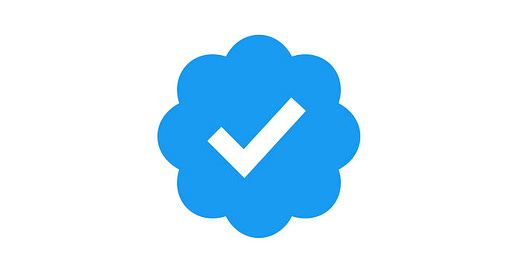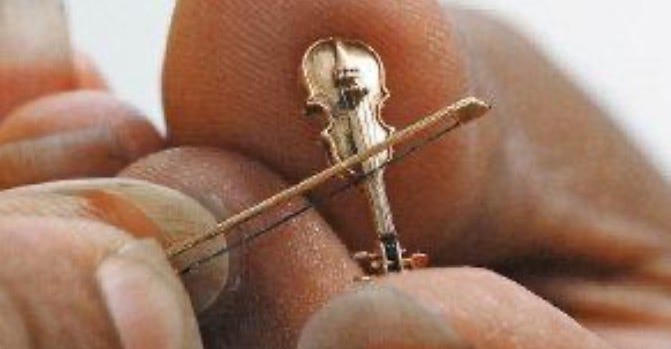The continued caterwauling over Elon Musk's Twitter takeover branched into the theater-of-absurd territory, when millionaire celebrities and other wealthy public figures elevated their outrage over the $8 per month fee for a blue checkmark. Previously free, the blue check indicated that an account's ownership was "verified." That is, some random troll wasn't pretending to be Kim Kardashian or Katy Perry or Justin Bieber (all top-20 Tweeters).
That most, if not all, these public figures leverage Twitter for self-promotion and therefore personal financial enrichment is an irony apparently lost on the squawkers, and I don't think I need to point out the pittance that ninety-six bucks a year is to people who make big bank through self-promotion and who get paid four or five figures for single tweets promoting products.
The broader picture here is that the "free" delusion has metastasized into an overarching sense of entitlement. "Free" services cost money, and that money has to come from somewhere. Twitter and Facebook and Instagram and other social media platforms offer their services "free" to users through a combination of advertising and data-gathering. Ditto for Google and other search engines. Even consumer brokerage firms such as Schwab, TDAmeritrade, and Fidelity got in on the "free" game. They make their money through a combination of interest earned on the cash in people's accounts and selling the trades themselves to people who read trends in those trades.
We all know, deep down, that "we" are the product being sold by the companies that offer us free stuff, and the vast majority of us are OK with that. It's almost unavoidable, really, unless one spends cash for everything, only uses certain search engines within an incognito browser and a VPN, doesn’t use a smart phone, and never sets a virtual foot on an e-tail site such as Amazon.
And, with Big Data's growth in parallel with Big Tech, "free" has become so ubiquitous that many expect it in more and more places. "Free" shipping. "Free" first checked bag. "Complimentary" breakfast. We all know that these and more are baked into the price we pay for products, air travel, and hotel rooms, but they lure us nonetheless. Even the "bottomless" cups of coffee in restaurants and "free" refills of soda at fast food joints are paid for by the prices charged. It takes discipline to check to see if something we want to buy is net-cheaper from someone that doesn't offer “free” shipping, and we shrug off the incorporated cost of refills even if we aren't re-fillers.
There's nothing inherently wrong with this sort of marketing gambit... until it alters our basic mindsets. Social media is apparently expected to be free, even to the people who use it to make a lot of money. The real mindset of the aforementioned caterwauling is that "someone else should pay for this service I use," and it has infiltrated the zeitgeist.
I recently discussed how Europeans have a better sense that they do indeed pay for, via taxes on their income and consumption, all the "free" stuff they get from government. Americans, on the other hand, have been told so often and so loudly that "free" means "someone else pays" that even our millionaire celebrities expect that. Of course, these are the same people who lust over swag bags handed out at glitterati events (twenty-six acting and directing nominees at the 2023 Oscars received bags containing $126,000 in goodies). Yes, swag bags are promotional in nature, as are such things as baseball gloves and spikes and other logo'd products given to MLBers, but they don't materialize out of the ether. They cost somebody something.
Therein lies the tragedy. We have taught each other an expectation of "free" that's decoupled from personally-borne cost. Musk feels that Twitter would work better and make more money by monetizing blue checks, and as owner that's his right. People can opt in or opt out, and of course they are not debarred from voicing their opinions. That’s their right.
We aren't debarred from criticizing those opinions, nor are we precluded from commenting on how misguided their thinking is. As Robert Heinlein iterated, "there ain’t no such thing as a free lunch." The principle expands into the "free rider problem" and the "tragedy of the commons." Calling something that someone else pays for "free" is corrosive and undermines the fundamentals of a free and equal society.
Look at this platform. Substack is free to many, but it isn’t “free.” The company makes money from paid subscribers, by drawing a percentage of what’s pledged to content creators. Those content creators offer some (most? all?) of their product to free readers, in the hope of enticing some to become paid subscribers, either to access paid-only content or as a gesture of good will and recognition of the creators’ efforts (yes, that was an un-subtle plug). It’s a viable business model, but imagine if everyone felt they were entitled to creators’ product. That’s what we see more and more of when it comes to services such as health care.
Once again, someone always pays. In a society that elevates personal responsibility, most understand that. In one that peddles “take money from someone else” as a viable economic model, there will be, at some point, a collapse.
As for millionaires whining about eight dollar blue checks? I offer the world's smallest violin, playing a dirge just for them.






One more quick thing... this brings to my mind the notion of things like "Business taxes" and "Gasoline taxes" and "Import fees" and the like. All these fancifully-named things SHOULD be called what they are: Income taxes. Worse, they're income taxes on income that's already been taxed at least once!
I'm sure they're out there, but I haven't found a tax or fee "on business" that We The People DON'T pay.
Really well said! As usual! Thanks for posting it!